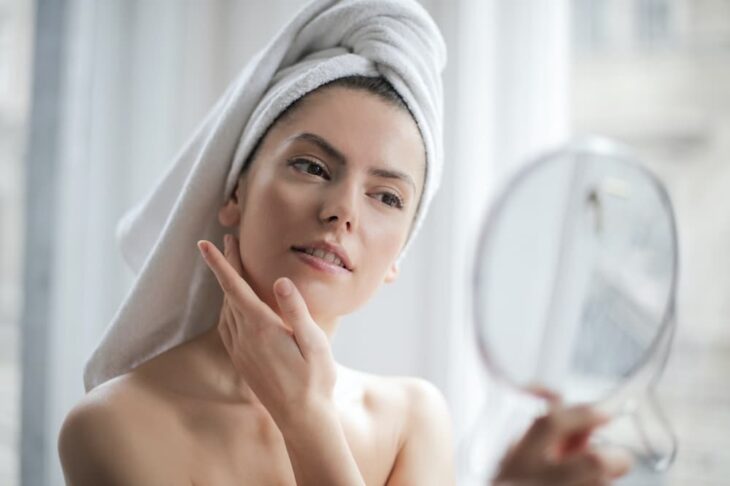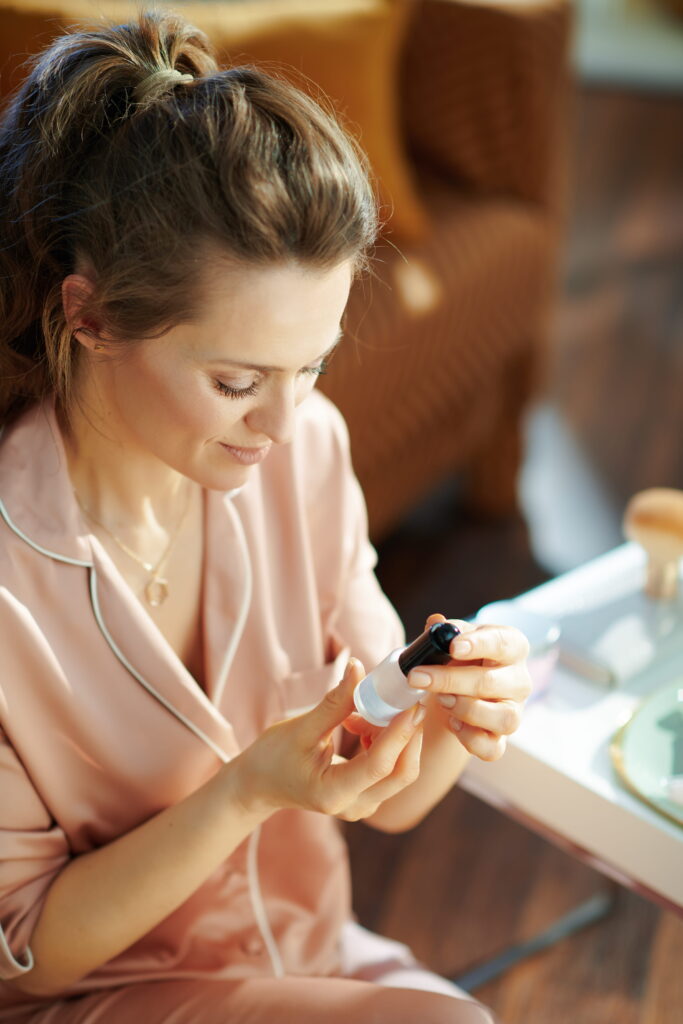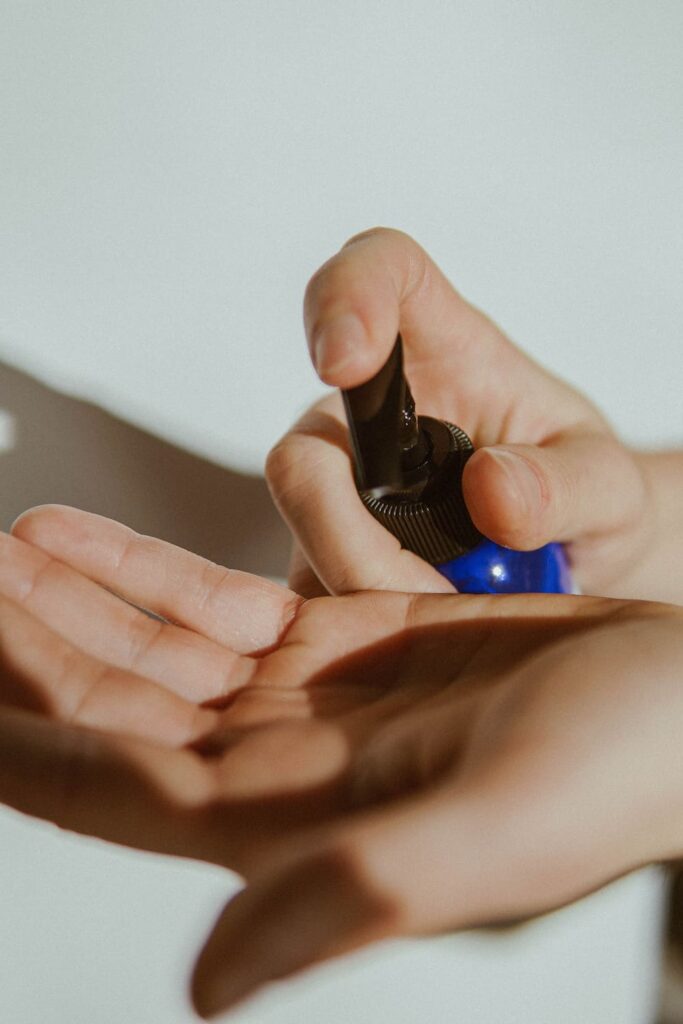Disclosure: Articles may contain affiliate links. As an Amazon Associate, we earn from qualifying purchases (at no additional cost to you). See our full disclosure here.
Last updated on February 26th, 2024 at 09:07 pm
Both peptides and retinol have garnered significant attention in the skincare community, each recognized for their unique capacity to revitalize and heal the skin.
While retinol, a derivative of vitamin A, is celebrated for its ability to accelerate cell turnover and stimulate collagen production, peptides are praised for their role in reinforcing the skin’s fundamental building blocks, promoting firmness, and reducing wrinkles.
So, peptides vs retinol–how do you know which is right for you? To decide, it’s essential to understand the distinct benefits of each and how these match up with your specific skin concerns. We’ll discuss the properties of these two powerful ingredients so you can see which will be the better fit for your skincare needs.

Peptides vs Retinol
Synchronized Skincare
Actually, you may not have to choose one or the other–striking a balance between peptides and retinol may be the best way to optimize your skincare routine since you’ll get the benefits of both.
Using peptides in the morning and retinol at night can reduce the potential for irritation while ensuring that your skin is receiving ample nourishment and restoration over 24 hours. This can be the perfect solution for those wanting to address multiple skin concerns.
The key to combining these ingredients effectively is to go slowly and cautiously and to pay attention to your skin’s reactions. Introducing one product at a time, and possibly alternating days, can provide an easier transition and allow for monitoring of your skin’s response.
Combining these two powerful anti-aging ingredients with care may just be the key to superior skin health over time.
Tailoring to Your Skin Type
It’s crucial to consider your skin type when deciding between peptides and retinol.
For those with oily or acne-prone skin, retinol can be immensely helpful. That’s because it not only has anti-aging properties but also helps control breakouts. Its exfoliation capability helps to keep pores clear, which can reduce the severity and frequency of acne.
Conversely, those with sensitive or dry skin types might gravitate towards peptides. Their gentle nature is less likely to irritate, and they can help to maintain and improve the skin’s moisture barrier.
Peptides can also be an option for those who are pregnant or nursing, as they provide a safe alternative to the potentially harsh effects of retinol. Also, when it comes to the question of retinol vs peptides for mature skin, peptides may have an edge in promoting firmness and elasticity while being less likely to irritate. Plus, they can be used in conjunction with other anti-aging products, such as vitamin C, for even better results.
The Powerhouse of Cell Regeneration: Retinol
Retinol has a stellar reputation as a powerful skin renewal agent. It goes deep within the dermis to convince older cells to turn over faster, making way for new ones.
This process helps to diminish the look of fine lines and wrinkles, leading to a more youthful appearance. Retinol also works to even out skin tone and can help to diminish hyperpigmentation, making it a go-to for those looking for an all-around improvement in their complexion.
However, the potent nature of retinol also means that it can be tough on sensitive skin. Users may experience dryness, redness, or peeling, particularly when first introducing retinol into their regimen. That’s why it’s best to start with a low concentration and gradually build up tolerance. When using retinol, you should also use a sunscreen with a high SPF, since retinol can make the skin more susceptible to sun damage.

Peptides: The Subtle Architects of Skin
Peptides are like the skilled architects of the skin, composed of amino acids that instruct your cells to produce more collagen and elastin. This helps the skin appear more bouncy, firm, and resilient, qualities often associated with youthful skin.
Peptides are also gentler than retinol, so they can be used in conjunction with other skincare ingredients without much concern for adverse reactions, making them a versatile tool in any skincare regimen.
Their gentle nature does not, however, mean that there’s any compromise on efficacy. Peptides might be slower in manifesting results when compared to retinol, but their consistent use over time helps fortify the skin and protect against environmental damage. This contributes to the long-term preservation of skin health, reducing the likelihood of premature aging.
Safety and Results
Back to our original question: peptides vs retinol, which is better? Both can offer remarkable results, but safety should always be a priority. It’s important to follow product directions, to patch test when adding new skincare products, and to be aware of how these potent ingredients interact with others in your routine. If you have any concerns, consulting with a dermatologist can provide tailored advice and peace of mind.
When gauging the performance of either peptides or retinol, patience is key. Results will not be instantaneous and can take several weeks to become noticeable. Tracking changes over time, with photographs or skin assessments, is a helpful way to see your skin’s progress and adjust your skincare strategy as needed.

In the end, whether to add peptides, retinol, or a combination of both into your skincare regimen is a personal decision. You’ll want to think about your unique skin type, concerns, and goals.
It’s worth emphasizing that both ingredients have proven track records when it comes to enhancing skin health and vitality. Retinol stands out for those seeking fast and robust results in cell turnover and pigmentation issues, while peptides might be the better path for those whose skin demands a softer approach or who are looking for an additive to other skin treatments.
When it comes to the debate over peptides vs retinol, what’s your take? Have you used either of these ingredients (or both of them)? Leave us a comment.
Also read:
3 Important Reasons to Revamp Your Skincare Regimen
DIY Coconut Lime Mint Sugar Scrub with Free Printable Labels
Glow Up Challenge + 5 Pages of Printables, Including Daily Trackers to Keep You Motivated
You can also find MomsWhoSave on Pinterest, Facebook, Instagram, and Twitter. Join us for updates.
Leave a Reply